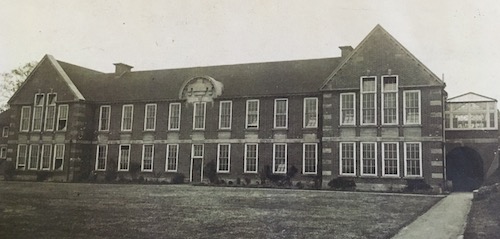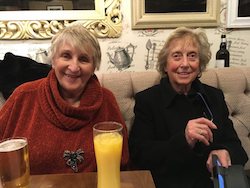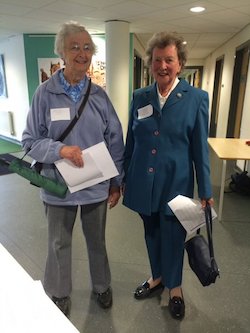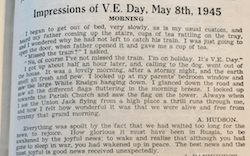Here's sharing some alumnae reflections of war-time school
Join the conversation by sharing news here
After chats together on the 'phone, with me and with each-other, over recent days during Covid-19 lockdown, a group of our war-time alumnae have set about writing their reflections of the second world war and about school at TGS (Tonbridge Grammar School for Girls as we were known then) as the war thankfully came to an end in 1945.
I am delighted to share with you the reflections of of dear friends Mira, Sally, Ruth and Dorothy.
Asked how lockdown differs from the war years, one alumna said
“gosh, this is altogether different and far more isolating. At least during the war we could go out!"
Mira, Sally, Ruth and Dorothy would love others to join in and share their reflections.
Join the conversation by sharing news here
Browse the School Magazine 1945 on the photos gallery here
Perhaps some of our younger alumni have grandmothers, great grandmothers, and aunts who were born in the mid 1930s?
Do get in touch with her and ask her to tell you about the end of the war and about war-time school.
And then share these rich historical stories with us here
When physical school returns after this awful virus has passed, we will have a reunion when we can get together to celebrate our school and share the war-time school reflections with the whole school community.
So get up into your loft and find all your school memorabilia!
With my best wishes
Pippa Blackstone
Development and Alumni
pippablackstone@tgs.kent.sch.uk
 Mira Howard nee Sutherland 1943 to 1952
1945 MEMORIES FROM A TGGS PUPIL BORN IN 1935
Mira Howard nee Sutherland 1943 to 1952
1945 MEMORIES FROM A TGGS PUPIL BORN IN 1935
"My name was Mira Sunderland and I joined the Preparatory Classes of TGGS in 1943 when I was 8 years old. I lived in Tonbridge just 5 minutes’ walk from the bottom of Pembury road. In a house at the bottom of Brook Street which had JUDD Grammar School for boys at the top. I mention that because boys Grammar Schools were always separate from Grammar Schools for girls. The curriculums were different and based on Sexual Differentiation. Girls curriculums were based on careers as Nursing and Teaching. Maybe Social workers at best but Places at Universities were almost unattainable for girls in 1945.
The bottom of Pembury road stays firmly in my memory. We all travelled to school on trains, buses and walking. Cars to take us were just not there or used. I walked to and used to wait at the bottom of Pembury Road every school morning and wait for my friends like JANET WATERMAN and HEATHER GOULDS to appear of the train from Sevenoaks. Then we all walked up the road to TGGS together.
Friendships were particularly important, possibly because of the feelings of insecurity which hung over us because of WORLD WAR 2. It started in 1939 when we were only 4. You could, with one hand, say we knew no different but with the other hand our parent’s insecurities, the sounds of bombs and aeroplanes and the radio news did not build our security. Wearing gas masks and sleeping in tin shelters inside our sitting rooms was disturbing, to say the least. There was a cinema in Tonbridge and my mother took me to see black and white film stories. There was also the News and I can remember hiding my head in my mother’s furry coat( yes ---we still made coats out of animal fur in those days) with sadness and fear when we saw our soldiers as prisoners in German war prison camps. They wore striped robes and were SO THIN. In 1945 when the war ended and English Prisoners of War started coming home from Germany, I can remember seeing skeletons of men walking up Tonbridge high street. At least they had not died and were home.
We had air raid shelters in school too. They were built at the top of the grass past the cricket pitch and running tracks. They were dug under the ground, before the open grass stage theatre run by MISS ANDREWS whose brother HARRY ANDREWS was a famous Actor in the Stratford on Avon Shakespeare Theatre. We were rushing to them quite often because Tonbridge was on the direct firing line from Europe to London. I will never forget the sounds of DOODLE BUGS…as I remember the bombs were called. It was OK when they were making their noises but when they stopped the noise---WATCH OUT and HIDE FAST. The bombs were going to DROP and SHATTER buildings and US. They often dropped before reaching their intended targets.
In a much lighter frame, children and I was one, used to collect shrapnel and bomb pieces----not sure why!! Let me now tell you some more lighter stories in TGGS, that spring to my mind. I was a happy pupil in MISS HUNTER’S CLASS. Particularly because I had returned from EVACUATION in North Wales. I was one of those children put on trains with satchels on our backs and sent to families a long way away from bombs for our safety. I was only 7and it just happened. Many stories for another day.!! I was returned home as AN UNSUCESSFUL PLACEMENT because I was locked in a chicken coup all night. Everyone spoke WELSH so God Knows what had happened.
Miss Hunter made us as happy as possible and it was good to be back home and, in her class. Another class that I remember is the ART class It was just along toward the staffroom and the other side of the corridor. I cannot remember the kind teachers name just her kindness. Even if she had an arranged class ongoing, she had a few empty desks at the back of the large room where we could go, sit and scribble, draw or paint ANYTHING It took our stress away and was very therapeutic. If we were naughty we were sent to stand outside the staffroom. We were either reprimanded by teachers or sometimes sent to see MISS ARNOLD the Headmistress.
I never remember feeling hungry or tired. We wrote with pens and ink as well as pencils. I can remember only having only jam in my sandwiches from home and a hole in my only pair of shoes. I was an adopted baby and my father was a dentist. NO, I had to say DENTAL SURGEON…. snobbery was rife in those days. I was sent to a friend’s free ELOCUTION lessons so that I would, as their child, speak POSH. We were extremely poor though, as there were very few people who could afford to visit a Dentist. Farmers were richer because they had chickens and much more to eat. My father mended teeth for a chicken instead of money and we had a good Sunday lunch. Our ration books were a very fair scheme though and a basic but healthy diet---if you could afford to buy. An OXO cube cost a penny. I think it was 2 eggs per person a week and I can remember enjoying my boiled egg, in a tiny stand with toast cut into strips to dip. The strips were called soldiers. We had school lunches which were called dinners in those days. I can remember salad every day though and I did not like salad. It was a buffet dinner and you could avoid the salad-----which I am sure was put there for health reasons and I made a mistake.
That brings me to such important political and sociological changes that took place when the war ended in 1945.Those changes made huge changes to TGGS.
First I need to do a bit of name dropping to explain why my memory is so strong in remembering those changes, especially at such a young age. You see my mother who adopted me was previously a teacher at TGSE. Her name then was MISS RONALD and she was the games teacher-----that is the name she told me anyway. She had kept a close contact with TGGS and was a friend of Miss Arnold. So, any forthcoming changes were discussed in my home ---frequently.
In 1945, before the war ended there had been a Parliament election. The public were angry about so much austerity. The war had made our social class divisions irrelevant and unfair. Churchill lost that election and it was won by Labour. The Prime Minister was CLEMENT ATTLEE. He had been a Social Worker in the East End of London and thought that the only way he could make significant social change was to enter politics. He undertook his role but Churchill continued to run the war issues.
I can still hear CHURCHILL’s voice telling us all on the news that the war had ended. I understood as a child that he was a good war Prime Minister but made mistakes too. There was too much austerity and poverty. The social class divisions were irrelevant and very unfair. Upper Class-Middle Class and Working class existed with gross disadvantages for the Working Class----the population majority too.
Attlee had a vision and saw education as the mobility ladder for the working class. The best can win and climb the financial and social ladder. So TGGS became one of the Grammar Schools that opened a COMMON ENTRACE EXAM for pupils to attend. It was open to all local State Primary School, Private Primary and us in the Preparatory Class in TGGS---any child in a nutshell. There were 3 tests in the exam---MATHS ENGLISH and an INTELLIGENCE exam. The Intelligence exam was created by HANS EYSENCK a German intelligence researcher who had lived in UK for many years.
That intelligence test saved me from failure. I was very dyslexic and that was not fully understood in 1945. We were written off as dumb children, which many of us were not. Miss Hunter said that I and JILL HUNTER would fail to pass the Common Entrance exam. We had a practice at the intelligence test, and she was amazed at Jill and my results. WE BOTH PASSED INTO TGGS later
My parents, particularly my father, had mixed feelings about allowing working class children into TGGS and told me not to mix with them in school. They did not know that I was already mixing with them anyway. We played in the streets in 1945 with skipping ropes balls and hoops. I hated snobbery even at that age.
There was another such important social change that Clement Attlee developed that I must continue. It was the NHS (National Health Service). Now everyone could see a Doctor or Dentist free. So ESPECIALLY important. I can remember we were not then, so poor, and many patients were making appointments with my Father. All he had to do is be present in his surgery and not asleep---my Mother often had phone calls.
I could write so much more but it is also time to stop. Pippa will have so much information from us all now our memory boxes are opened
Pippa ---MAKE A JIGSAW 1945
Mira Howard (Sunderland
Pic: Mira and Sally at our annual reunion, January 2019

Sally Murphy nee Hayter 1943 to 1954
"I joined the school in the prep department in January 1943. The teacher in charge was Miss Hunter----she was strict but wonderful.
I lived in Leigh and travelled by bus each day with my sister, Molly, who was already at the Grammar School. However during the war, the bus did not always run. So we walked -----whatever the weather!
Walking up Pembury Road we frequently saw German Prisoners of War marching down from the camp which was on the site of where the Weald of Kent School is today.
At school we had many lessons in the air-raid shelters which were built on what is now the site of the Tech Block. In those days the site was a Hockey pitch. The rooms were underground, reached by steps with railings.
My sister Mollya was in main school 5th year during the war and had to take the equivalent of her Gcse exams. If there was an air raid during the exam the students had to dive
underneath the individual desks, and stay there until the siren went all clear: What a way to sit an exam!
In the prep school each pupil had their own garden. We grew a few vegetables etc. Such knowledge was very useful and good experience, especially in war time.
Thank you for all that you do.
Sally
Dorothy Gant (nee Bibby) 1945 to 1954
I started at Tonbridge Girls Grammar School in September 1945, just after the 2nd World War ended. Miss Arnold was Headmistress and the School still had a Preparatory Year, the Lower 3rd. Beryl Cook and me were 10 when we started in Upper 3 C , our Birthdays being 4 days apart, (31st Dec and 1st Jan).
When we got on the train at Edenbridge to go to Tonbridge Station to go to school, we were all in groups that we'd been told to be in and one of the Prefects or older pupils was in charge.
The only way into the School was near the bottom of Deakin's Lees and Miss Warren and Miss Mallard lived in the Flats just inside the gate there. We would go in and out that main entrance. Only members of the Upper 6th were allowed to use the school door which went out at the top of the stairs. When we walked down the corridors, we always had to stay in single file and not talk.
In the Lower 4th (I think!) we went into Divisions in some subjects and I was in the 1st division in Maths as that was my best subject! In 1947, the Labour Government ruled that all those doing Matriculation (as O Level was then called) had to be aged 15 by Sept 1949. Miss Arnold decided that it would be best for pupils to repeat the Lower 5th year rather than the Upper 5th when they would take the exams. So, this hit Beryl and me and others as well. I was an absolute pain in Lower 5th Maths lessons, Division 1, taught by
Miss Sharp, so I was taken out of the Class and taught individually by Miss Warren, the Head of Maths, and I then started A level Maths a year early.
Tennis, Cricket, Rounders, Netball, Hockey were all played on the pitches in the School grounds and we always enjoyed acting many plays on the outdoor Theatre at the bottom of the pitches.
Pic: Ruth and Dorothy and Foundation Day 2016

Ruth Barrow 1946 to 1953
“I was the only new pupil from my school but Margaret Lorimer, 2 years older than me took me under her wing and piloted me on the train at Penshurst and walked with me up the Pembury Road. I had to cycle 3 miles to the station before meeting up with Margaret.
The train only got us to school on time if it was punctual so we often were late and had to go into prayers just for the notices. I missed meeting up with the form at register and found it difficult as I often didn’t know what was going on. I found it difficult to know where my lessons were.
1946-47 was the hardest winter on record; journeys to school, especially the cycle ride were challenging, the train was often late and we were given hot chocolate on arrival at school. We often were allowed to catch an earlier train home but for us on the Edenbridge line this meant catching the 2.15 pm train so we missed afternoon school. I am afraid this winter spelled the end of the romance of snow for me, I just longed to see grass verges again.
Our home work was marked out of 10 and every 3 weeks all our marks were added up and percentaged and Miss Arnold, the Head teacher, would come to our form for mark reading. If we averaged over 75% we had honours, over 60% was credit. We had to stand when our name was called. It was a very serious occasion.
I enjoyed my lessons but hated writing English essays. We read Prester John by John Buchan, looking at it now I don’t think it was at all suitable for 11 year old girls but it was the age when the empire was glorified, it is terribly racist as it leaves us feeling that we are a superior race.
I enjoyed Physics lessons with Miss Pomeroy who I understood came back to teach at the age of 70. She gave me a real interest which led me to study Physics and then teach it for 38 years!
Best Wishes
Ruth
Pic: Extract from School Magazine 1945 page 7

We hope others will join us by sharing your reflections of school at the end of the war. Share your stories here
Find your school memorabilia in your loft and when physical TGS returns we will have a reunion to celebrate our school and share stories a a whole school community.
Pippa Blackstone
Development and Alumni
pippablackstone@tgs.kent.sch.uk
